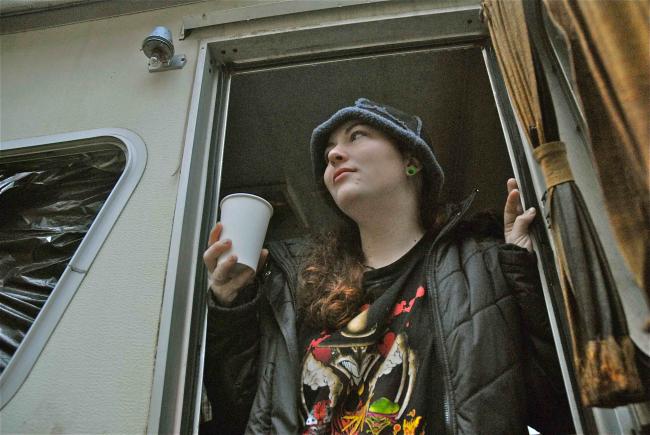VIDEO: Hero for the homeless
"Unfortunately, this is the homeless generation nowadays, people in their 20’s," says "Rezen," who lives in her RV with others in West Seattle. Click the image to see a second photo.
Tue, 11/24/2009
It was a busy morning in West Seattle and White Center for Attorney Tricia Lapitan Tuesday, Nov. 24. She woke Rafael at 7:15 am. Ten minutes later she got Rich out of his deep slumber. Another 15 minutes passed, and she woke up 13 young people and their two dogs. But nobody was complaining.
That’s because Lapitan was not serving warrants or subpoenas, but rather peanut butter and jelly sandwiches, hot chocolate, and warm, dry winter clothes to these homeless individuals. Lapitan is the founder of "Heroes for the Homeless," a Seattle area non-profit that, as her website states, is “quietly helping the most vulnerable of the homeless.”
Lapitan leads organized, outreach blitzes of several people with vehicles, armed with food, clothes, and emergency supplies, twice a month from Seattle to Bellingham, seeking homeless huddled in sleeping bags, sprawled along urban sidewalks, nestled under trees in soaked lean-tos, or crowded in funky old out-of-the-way motor homes that may no longer operate.
On this day, however, she worked alone.
Rafael appeared very old and stiff, and was wrapped in a blanket with an American flag graphic. He was hidden under a storefront overhang near Roxbury and 16th. A large trash bin sat between him and his wheelchair.
Rich, maybe in his thirty’s, was camped against the outside wall of a nearby tidy church.
A tight-knit group of 13 in their early 20’s occupyied their three locked campers on a wooded stretch of road between White Center and South Park.
“I don’t make judgments on why people are homeless,” said Lapitan, referring to the youngsters in the RV's. “Some might have a history of abuse, or have been emancipated from foster care. After age 18 the state stops paying. That actually happens a lot. These people have a better chance than the guy behind the trash can with the wheelchair. They are safer together than they are separately. If they can support each other (…) and stay out of jail, that’s really the best thing for them. At their age, and lack of disabilities, they won’t qualify for state assistance like food stamps. Just hygiene is going to be a problem for them to find a job. It’s pretty stressful to be in the situation they are in."
An attorney for the Munipal Court, Lapitan sees what she considers the dark underbelly of the criminal justice system.
"The Community Court prosecutes homeless for theft,” she said. “Time and time again they are jailed for stealing food. It would cost the city a lot less to just give them food in the first place.”
She points out that it is illegal to hand out food and clothes to those in need in public places. She said authorities are more concerned about organizations stationing themselves in a park because of safety issues, and added that handing out supplies like her organization does is somewhat tolerated.
"The best way to serve those individuals is to take services to them," she siad with mild defiance. "It's a little edgy, but works best for us. Those are the folks who will meet their nutritional needs by stealing or digging in garbage cans. Were all about making sure people maintain their dignity. We do hear 'no' sometimes when we offer help and that’s fine. (Homeless) people always ask if we're associated with a church. We're not faithbased, so they're wondering what our motivation is. We're not there to give some kind of pitch."



